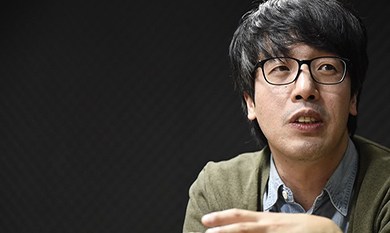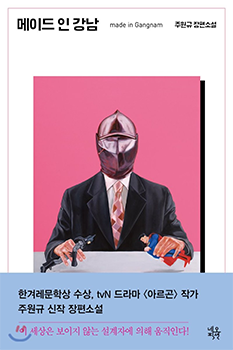

Seoul’s affluent Gangnam district was not as prestigious as people thought, according to a novel published early this year in February entitled “Made in Gangnam.” The story exposed the shady reality of the district’s nightclubs.
Joo Won-gyu, author of “Made in Gangnam,” went undercover in Gangnam from March to October of 2016 to conduct research for his novel. While investigating, he obtained insight on the reality of nightlife in Korea and saw a completely different image of the district.
According to Joo, he wanted to publish the story as a reportage but was rejected as publishers found the story “unrealistic.”
“90 percent of the novel is based on my experience, including the characters references being those I met,” he said. “I wanted to publish it as an exposé, but the publishers found it hard to believe the story. So, I added a fake murder case to make it a work of fiction.”
When asked why he chose to cover such story, Joo mentioned that while channeling with runaway teens, he found out that a large number of them were working at nightclubs in Gangnam.
“I was networking with runaway teens hoping to help them as I was one as well,” Joo added. “In early 2016, I suddenly lost contact with a few. But, one day when I finally got in touch, I heard that they were working at a nightclub. Those who were not working there also showed interest in joining because of the high pay.”
It was common for runaway teens to work in bars, but it was new for Joo to hear that they were working at nightclubs because he never knew it was a place one could earn money. Hearing this, he was determined to find out what they were doing and why they were keen on working there.
“I realized that the best way for me to get back with them was to work in the same environment as they were reluctant to meet and talk,” Joo stated. “To do so, I found part time jobs in Gangnam where most nightclubs and bars were located.”
Joo worked as a call girl carpool driver, valet parking driver, delivery man, and a facilitator in the nightclubs. There, he met runaway teens aged 14 to 18, working as call girls.
“They worked under merchandisers (MD) in the club who acted as procurers,” Joo explained. “They made fake IDs for underaged girls so that they could work as call girls for VIP customers at their nightclub. They also took 90 percent of the commission, paying very little to the girls.”
The author expressed anger on how the MDs approached the girls by impersonating entertainment agencies, convincing naive teens that all famous celebrities gained fame this way. They manipulated the teens into voluntary sexual exploitation.
“Drugs were also part of the nightlife culture,” he recalled. “The amount of violence and exploitation towards these girls were unbelievable. MDs would make them take drugs like date rape drugs called GHB to “mate” them with VIPs.”
Joo added that police collusion mentioned in the novel was far worse in reality. While he was undercover, many reports involving violence in the nightclubs were filed. However, none of them were actually charged.
“Everyone remained silent,” Joo said being dumbfounded. “Reports were never revealed because the Gangnam district police would be bribed to stop at the first investigation. For serious cases, nightclub owners would hire a lawyer who fabricates evidence to drop the case.”
Drug abuse, sex exploitation, police corruption, and violence were experienced by the author, leaving him in agony. He was even often hit for no reason when he worked as a driver.
“These issues fall under the twisted reality of Korea’s discrimination towards sexual objectification of women,” Joo stressed. “I hope people would not be skeptical about these problems. It is the truth and reality. We need to work together to get rid of this patriarchal society. The future lies in the hands of the current generation to work for change.”

